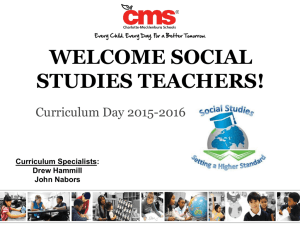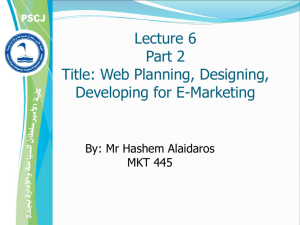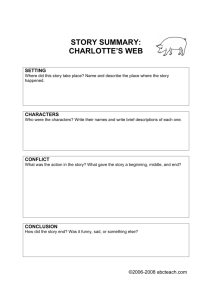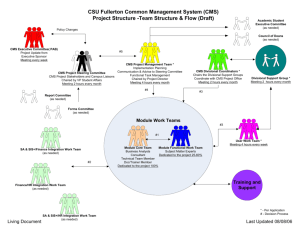STATE OF NORTH CAROLINA IN THE GENERAL COURT OF JUSTICE COUNTY
advertisement
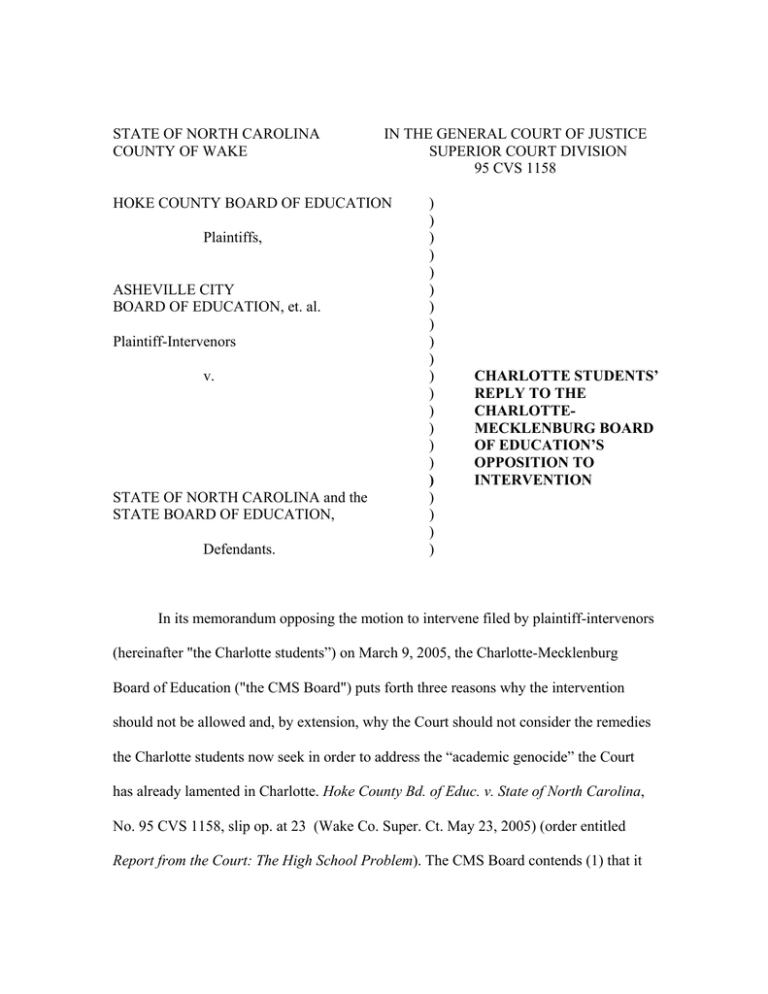
STATE OF NORTH CAROLINA COUNTY OF WAKE IN THE GENERAL COURT OF JUSTICE SUPERIOR COURT DIVISION 95 CVS 1158 HOKE COUNTY BOARD OF EDUCATION Plaintiffs, ASHEVILLE CITY BOARD OF EDUCATION, et. al. Plaintiff-Intervenors v. STATE OF NORTH CAROLINA and the STATE BOARD OF EDUCATION, Defendants. ) ) ) ) ) ) ) ) ) ) ) ) ) ) ) ) ) ) ) ) ) CHARLOTTE STUDENTS’ REPLY TO THE CHARLOTTEMECKLENBURG BOARD OF EDUCATION’S OPPOSITION TO INTERVENTION In its memorandum opposing the motion to intervene filed by plaintiff-intervenors (hereinafter "the Charlotte students”) on March 9, 2005, the Charlotte-Mecklenburg Board of Education ("the CMS Board") puts forth three reasons why the intervention should not be allowed and, by extension, why the Court should not consider the remedies the Charlotte students now seek in order to address the “academic genocide” the Court has already lamented in Charlotte. Hoke County Bd. of Educ. v. State of North Carolina, No. 95 CVS 1158, slip op. at 23 (Wake Co. Super. Ct. May 23, 2005) (order entitled Report from the Court: The High School Problem). The CMS Board contends (1) that it adequately represents the interests of the Charlotte students, (2) that its interests, as well as the interests of other parties, will be prejudiced if intervention is allowed, and (3) that the Charlotte students are not appropriate plaintiffs. None of these three reasons has any merit. The North Carolina Constitution gives to Charlotte students Leandro rights; to the CMS Board, by contrast, the Constitution gives Leandro duties. See Leandro v. State, 346 N.C. 336, 346-47, 488 S.E.2d 249, 25455 (1997). The Charlotte students allege and are prepared to show that the CMS Board has violated its Leandro duties by pursuing chosen policies and by withholding promised interventions that have deprived the Charlotte students of their constitutional rights. (1) The CMS Board surely cannot represent the interests of the Charlotte students with the necessary zeal while its own challenged policies and practices are under attack. The Charlotte students have well-founded legal claims that the CMS Board is certain to deny or avoid. The Charlotte students seek legal and equitable remedies that the Board has strongly opposed—including a change in student assignment policy or, in the alternative, substantial increases in funding and resources for each of CMS’s high poverty schools. (2) In addition, the ‘prejudice’ claimed by the CMS Board is not the prejudice envisioned as a valid ground for denying intervention under N. C. Gen. Stat.§ 1A-1, Rule 24(a). The only prejudice properly considered by a court when weighing intervention under Rule 24(a) is prejudice caused by the intervenor’s delay in filing. There has been no such delay in this case. The Charlotte students moved to intervene on February 9, 2005, shortly after the Court first turned attention to the “High School Problem” in November 10, 2004, and well before the first (non-adversarial) hearing began on March 2 7, 2005. There has been no answer filed by the Charlotte Board. No discovery has been taken, no experts deposed, no documents exchanged. The Charlotte Board can claim no potential delay nor any meaningful prejudice. (3) Finally, each of the Charlotte students who seeks intervention brings unique injuries resulting from the gross misfeasance or malfeasance of the CMS Board and their respective schools. The attack by the CMS Board on the students’ “appropriateness” as injured parties represents a premature "stealth" challenge to the merits of the students’ claims. It is well-established, however, that for the purposes of considering a motion to intervene under Rule 24, the court should accept all well-pleaded, nonconclusory allegations of the intervening party as true. For this reason, the Board's challenge to the merits of the students’ claims is not relevant at this stage. I. THE BOARD DOES NOT ADEQUATELY REPRESENT THE STUDENT INTERVENORS’ INTERESTS The CMS Board claims it “adequately represents the interests” of the Charlotte students and suggests that it "is well-positioned to bring evidence to the Court concerning its student assignment plan and its current review of that plan.” Opposition Memo at 5-6.1 The insurmountable irony is that the Board undoubtedly plans to defend its student assignment plan and to justify the resulting injuries it has caused tens of thousands of students, while the Charlotte students seek to challenge that same student assignment plan as a root cause of their denial of the opportunity for a sound, basic education. 1 References to the Urban District Plaintiff-Intervenors' Opposition to Motion to Intervene By Rafael Penn, et al., dated February 15, 2005, will be indicated by the abbreviation "Opposition Memo" followed by the number of the page on which the reference may be found. 3 The basic principles governing Rule 24(a) intervention of right are generous and relaxed. According to the Supreme Court of the United States, a proposed intervenor should be allowed to join as a party if he or she can show "that the representation of his interest 'may be' inadequate; and the burden of making that showing should be treated as minimal." Trbovich v. United Mine Workers of America, 404 U.S. 528, 538 (1972). A majority of circuit courts have since agreed that, especially in cases involving the public interest, even a minimal showing is enough to prove inadequacy of representation.2 In this case, the Charlotte students more than exceed the minimal required showing. They hope to assert their own Leandro rights and to demonstrate that the CMS Board has violated its Leandro duties. They seek, in fact, to realign the CMS Board as a party defendant in this phase of the lawsuit. The CMS Board remains steadfastly unwilling either to change the student assignment policies that have injured tens of thousands of CMS students (who consequently must endure the crippling learning 2 See e.g., Yniguez v. Arizona, 939 F.2d 727, 735 (9th Cir. 1991) (court allowed intervention by interest group even after judgment had been rendered because attorney general failed adequately to represent their interests.); Utah Ass'n of Counties v. Clinton, 255 F.3d 1246, 1254 (10th Cir. 2001) (“The possibility that the interests of the applicant and the parties may diverge ‘need not be great’ in order to satisfy this minimal burden”); Coalition of Arizona/New Mexico Counties for Stable Economic Growth v. Dep't of Interior, 100 F.3d 837, 845 (10th Cir. 1996) (“The possibility of divergence of interest [between existing parties and proposed intervenors] need not be great in order to satisfy the burden of the applicants”); Fed. Savings and Loan Ins. Corp. v. Falls Chase Special Taxing Dist., 983 F.2d 211, 216 (11th Cir. 1993) (“[A]ny doubt concerning the propriety of allowing intervention should be resolved in favor of the intervenors” and “[g]iven the fact that the parties in the litigation that allegedly represent the appellants' interests possess interests inimical to the appellants, we conclude that the existing parties to the lawsuit may not adequately represent the appellants”). See also Washington Electric Coop., Inc., v. Massachusetts Municipal Wholesale Elec. Co., 922 F.2d 92, 98 (2nd Cir. 1990) (“While the burden of showing such inadequacy may be minimal” it was not met in this case); Supreme Beef Processors, Inc. v. USDA, 275 F.3d 432, 437-438 (5th Cir. 2001) (“NMA [intervenor] need only show that Supreme's representation ‘may be’ inadequate”); Fund for Animals, Inc. v. Norton, 322 F.3d 728, 735 (D.C. Cir. 2003) (“We have described this burden as ‘not onerous’”). 4 environments in CMS’s high poverty schools) or in the alternative, as the Charlotte students allege in their first amended complaint, to substantially increase the human, fiscal, and educational resources provided to students in those high poverty schools. Indeed, since the Charlotte students filed their original motion to intervene in March, thereby putting the CMS Board on notice that its student assignment policies may well be violating students' Leandro rights, the CMS Board has acted to reaffirm and even strengthen objectionable features of these very policies. 3 It has done so despite clear evidence that their three year experiment with the 2002 student assignment system (1) creates high school environments that discourage recruitment and retention of effective teachers and administrators, (2) reduces the odds students will experience a safe and orderly school environment, and (3) discourages— rather than encourages—high student achievement.4 3 Thus, the CMS Board’s unsuitability as the guardian of the Charlotte students' interests has actually increased since the students moved to intervene in March of 2005. During the summer of 2005, the CMS Board adopted new student assignment policies that further entrench the priority of “neighborhood schools” over the right of the Charlotte students to attend quality schools regardless of residency. (Comprehensive Reassessment of Student Assignment Status Report: May 31, 2005). In sum, the CMS Board reduced the precious few transfer options available to students consigned to high poverty schools See copy at: https://extranet.cms.k12.nc.us/news/stories/internetNews/pdf/2444StatusReview.pdf The new policy replaces the 2002 district-wide student assignment lottery with a schoolby-school lottery that actually limits transfers to schools with available seats for additional students, thus eliminating many of the most desirable transfer options from the lottery. In addition, it closes two of the few remaining escape routes for students in underperforming, high-poverty schools by eliminating the priority consideration previously given to students with FRPL status and/or low reading score achievement. 4 See Hoke County Bd. of Educ. v. State of North Carolina, No. 95 CVS 1158, slip op. at 32-38 (Wake Co. Super. Ct. April 4, 2002) (specifying as criteria necessary for effective schools “an effective, competent and motivated principal”; “high-quality, full-time teachers who teach in their fields of expertise”; “a safe and orderly environment”; and “high expectations of teachers and students”). 5 The CMS Board suggests, however, that its deep differences with the Charlotte students amount to nothing more than disagreements over “litigation strategy,” and that it has an “identity of interest” that makes the CMS Board’s representation adequate. Opposition Memo at 8, citing as potential support Bradley v. Milliken, 828 F.2d 1186 (6th Cir. 1987); Jenkins v. Missouri, 78 F.3d 1270 (8th Cir. 1996); Evans v. Buchanan, 130 F.R.D. 306 (D. Del. 1990). Tellingly, however, in each of the cases cited by the Board, strong representative classes of parents/students were already present as parties to the litigation, able and willing to contest the factual and legal assertions made by the defendant school boards. The real point of these authorities seems to be that when— unlike in the instant case—there is already a representative class advocating independently for student interests, intervention by additional parents or students may not be allowed. By contrast, intervention is fully justified when, as here, the central issues the intervening party seeks to raise have been ignored and the existing party/school board acts to frustrate those issues. Bradley v. Pinellas County School Bd., 961 F.2d 1554, 1556 (11th Cir. 1992). The CMS Board cites United States v. South Bend Cmty. Sch. Corp., 692 F.2d 623 (7th Cir. 1982) as one case in which two parent groups were denied intervention because of opposition by a local school board. Opposition Memo at 7. But that case is far from apt. In South Bend, the United States was serving as a vigorous plaintiff to force the defendant school district to end student assignment policies that enforced racial segregation. The school district agreed to a accept consent decree, and it developed a desegregation plan after extensive public comment and a dozen special school board meetings. Only at the last moment did other parent parties attempt to intervene, one 6 seeking to raise a mere variant of the concerns the United States was ably asserting as plaintiff, the other urging the district to deny all allegations and force a full trial, despite clear evidence of racially segregative practices. The court's narrow holding denying these two motions in South Bend was clearly limited to that special legal context. In the present case, by marked contrast, CMS faces no adversary party at present. The State is already a defendant, the low-wealth plaintiffs lack any immediate interest in the details of the CMS system, and the Court itself is, in truth, the only voice currently raising questions about CMS Board's policies and practices. There has been no adversary hearing at all, much less any consent decree or other final judicial resolution of the issues the Charlotte students hope to bring to the attention of the Court.5 Intervention here is fully warranted. 5 We note that the CMS Board does not discuss the doctrine recognized in some cases that governmental bodies are presumed to provide adequate representation when acting as a representative of all its citizens. Perhaps the Board chose not to rely on this presumption because it is so easily overcome. See United States v. City of Los Angeles, 288 F.3d 391, 401-403 (9th Cir. 2002) (holding that police officers' collective bargaining unit made the minimal showing necessary to establish that its interest was not adequately protected by city, since city's interests as employer were antagonistic to intervenor's interest as employees); Utah Ass’n of Counties v. Clinton, 255 F.3d 1246, 1254-1256 (10th Cir. 2001) (noting that to rebut the presumption requires only a minimal showing); Chiglo v. City of Preston, 104 F.3d 185, 188 (8th Cir. 1997) (holding that “the government only represents the citizen to the extent his interests coincide with the public interest. If the citizen stands to gain or lose from the litigation in a different way from the public at large, the parens patriae would not be expected to represent him”); Meek v. Metro. Dade County, 985 F.2d 1471, 1478 (11th Cir. 1993) (allowing intervention when citizens interests, though similar to those of the county, were not identical); Nash v. Blunt, 140 F.R.D. 400, 403 (W.D. Mo. 1992) (“Allowance of intervention does not require a finding that the intervenors' interests have not been and will not be adequately represented by the state officials. Intervention is allowed when this ‘may’ happen.”). In addition, as the Board is no doubt aware, strong recent authority dismisses the principle that the government is presumed an adequate representative in public interest litigation. Grutter v. Bollinger, 188 F.3d 394, 400-401 (6th Cir. 1999) (permitting African American students to intervene in higher education affirmative action case because “this circuit has 7 II. THE CMS BOARD EMPLOYS THE WRONG STANDARD IN ASSERTING THAT THE CHARLOTTE STUDENTS' INTERVENTION WOULD "PREJUDICE" THEM OR OTHER PARTIES The CMS Board also opposes the Charlotte students' motion to intervene by asserting that the proposed intervention “would force CMS to prepare a defense of its student assignment plan,” and “would invite a dramatic expansion and diversion of the current litigation,” all of which ostensibly constitute "prejudice" to the Board. Opposition Memo at 9-10. The Board misunderstands the basic nature of the prejudice inquiry under Rule 24(a). The key to Rule 24 prejudice is not whether parties to the litigation would be required to prepare additional defenses, but whether the proposed intervening party’s unwarranted delay would cause prejudice to existing parties. Stallworth v. Monsanto Co., 558 F.2d 257, 265 (5th Cir. 1977). Here, there is no serious argument for such an assertion, since the Charlotte students moved to intervene shortly after the Court first turned its attention to the “High School Problem” in its order of November 10, 2004. Indeed, they filed their motion to intervene on February 9, 2005, almost a full month before the first non-adversary proceeding began on March 7, 2005. The CMS Board cites State Employees’ Credit Union, Inc. v. Gentry, 75 N.C. App. 260, 330 S.E.2d 645 (1985) for its general assertion that prejudice is a factor to be weighed in consideration of Rule 24 intervention, along with “the status of the case…the reason for the delay in moving for intervention; [and] the resulting prejudice to the applicant if the motion is denied; and any unusual circumstances.” Gentry, at 264. But declined to endorse a higher standard for inadequacy when a governmental entity in involved.”) 8 “timeliness,” the CMS Board concedes, “is a ‘threshold question’ with respect to all motions for intervention.” Opposition Memo at 8. Indeed, the prejudice a court must weigh under Rule 24(a) is restricted to prejudice flowing from a delay caused by the intervenor’s failure to act in a timely fashion—severe inconvenience to the parties "which would result from the would-be intervenor's failure to request intervention as soon as he knew or reasonably should have known about his interest in the action.” Stallworth, 558 F.2d at 265 (also noting that “although it is sometimes suggested that any prejudice that would result by virtue of intervention is relevant…this is incorrect”); see also Gould v. Alleco, Inc., 883 F.2d 281, 286 (4th Cir. 1989) (noting that intervention is appropriate when the court finds “the dispatch with which the intervenor-applicants made their motion relative to the point at which it became clear that their interests were not being adequately represented by the existing defendants” was sufficient, although the court did not find such dispatch on the facts of Gould). The CMS Board does not, indeed cannot, allege any such delay on the part of the Charlotte students. Instead, the Board presents a litany of complaints about the complexity and difficulty of defending against the Charlotte students’ intervention. Rule 24, however, simply does not shield a party from facing complex issues if its conduct has been unlawful and therefore difficult to defend. In fact, in its July 30, 2004 opinion in this case, the North Carolina Supreme Court explicitly recognized that the Leandro issues presented by urban districts might well become subject to this Court's resolution within the four walls of the Leandro litigation: “As for the pending cases involving either other rural school districts or urban school districts, we order that they should proceed, as 9 necessary, in a fashion that is consistent with the tenets outlined in this opinion.” Hoke County Bd. of Educ. v. State, 358 N.C. 605, 648, 599 S.E.2d 365, 397 (2004). The CMS Board also seeks to avoid this intervention by invoking the spectre of duplicative evidence or potentially unlimited interventions by other potential parties. See Opposition Memo at 10-11. We are confident, however, that the Court is fully capable of exercising its discretion to confine this lawsuit within manageable proportions. Cf. United States v. Reserve Mining Co., 56 F.R.D. 408, 419 (D. Minn. 1972) (“While the Court here decides that the applicants herein allowed to intervene will come ‘up to bat’ nevertheless the number of ‘strikes’ they will be allowed by way of introducing evidence are matters that can best be answered at a later time.” and asserting that the Court ''will expect and require that its orders curtailing presentations will avoid repetition); see also, 6 James Moore, Federal Practice § 24.23 (3rd ed. 2005) (noting that “[a] trial court is not restricted to either granting unlimited intervention or denying the motion when deciding a motion for permissive intervention. The court may grant intervention with specific conditions imposed, such as limits on the intervenor's right to conduct discovery or to assert certain types of claims. These sorts of limits are intended to minimize potential delay and confusion and are within the district court's discretion”). The Board laments that intervention might further delay the specification of a remedy to provide sound basic educations to all children. Opposition Memo at 12. This assertion is a logical non-starter. The Charlotte students allege the CMS Board’s present policies are a principal cause of the widespread and continuing educational failures in CMS high schools. Allowing the case to move forward without considering these claims might well expedite the timetable of the litigation, but a hear-no-evil, see-no-evil review 10 of the CMS system without meaningful adversary presentation will bring the CMS Board no closer to living up to its constitutional mandate under Leandro. To be sure, judicial economy is an important consideration and part of the impetus for the revised Rule 24. Security Ins. Co. v. Schipporeit, Inc., 69 F.3d 1377, 1381 (7th Cir. 1995). The fact is that genuine efficiency will be best served by joining the Charlotte students as plaintiffs to assist the Court in its serious examination of the educational meltdown in CMS. Allowing the Charlotte students’ motion to intervene will assure a thorough investigation of present and prior failures, a full record at trial, and expert consideration of remedial alternatives to aid the Court's final resolution. In the end, if the Charlotte students are not represented in the current litigation, it is they who will suffer the gravest prejudice, both legal and educational. They clearly have an interest in their own educational futures and their despoiled right to "a sound basic education"—a point CMS does not contest. Given their important interest in a sound basic education, the Charlotte students must be allowed to speak for themselves to preserve the integrity of the adversarial process. III. THE CHARLOTTE STUDENTS ARE APPROPRIATE PLAINTIFFS, AND THE CMS BOARD’S ATTEMPT TO REACH THE MERITS PREMATURELY IS INAPPROPRIATE The CMS Board seeks to disqualify each of the proposed student plaintiffs by peremptorily turning to the merits of their individual claims. CMS is wrong, both as a matter of procedure and as a matter of fact, to contend at this juncture that these individual plaintiffs have not, in fact, been educationally injured, and/or that their injuries are their own fault, not that of the CMS Board. 11 First, by parsing out each plaintiff’s situation to determine if they have been “injured” by the student assignment plan, the CMS Board ignores the more pervasive injury that all of these students have suffered in being forced to choose among economically isolated, poorly-performing schools6 Second, the CMS Board attempts to assert that students like Clifton Jones have not been injured because, under any remedy that might eventually be ordered by the Court, the schools they presently attend “would almost certainly fall within any floor and ceiling the CMS Board might adopt.” Opposition Memo at 13. Both of these points miss the mark, and moreover are directed exclusively to the Charlotte students' request for a change in the CMS Board's student assignment policies. However, the Charlotte students have amended their complaint to demand, as an alternative remedy, that the CMS Board provide substantially more human, fiscal, and 6 For example, one of the proposed plaintiffs, Clifton Jones, has a home school assignment at Independence High School, which has a FRPL of 35.67%, an ABC composite score of 51%, and an end-of-course (EOC) composite of 49.1%. Clifton Jones selected Phillip O. Berry as his transfer preference, a school that has 57.54% FRPL, an ABC of 45%, and EOC composites of 41.5%, all worse than his home school. The Board points to this as evidence that Clifton Jones did not sustain the injury he has alleged. We offer to prove that Clifton Jones did not select Phillip O. Berry based on its scores or FRPL level, but instead because of the vocational opportunities it purportedly offered to him. The real point of Clifton Jones’s story is how limited his options were and are. The other high schools in his transportation zone were: (1) Butler, a higher performing school within CMS—FRPL of 19%, ABC of 75% and EOC of 72.2%—but one which was closed to student transfers; (2) East Mecklenburg—with a FRPL of 32.11%, ABC of 63% and EOC of 60.5% —also effectively closed to transfer, with 103 students on a wait list; and (3) Garinger—with a FRPL of 57.03%, ABC of 45% and EOCs at 43.1%—lower scores than Clifton’s home school. Once the entire student assignment picture is considered, it becomes clear that Clifton Jones selected the school he thought would give him the best educational opportunity. Unfortunately, he was forced to do so from a very limited menu of options. 12 educational resources to every high poverty, low-performing CMS high school, enough to assure "a sound basic education" to each student, whatever its student population. The CMS Board, in turn, will almost certainly claim that it is presently addressing the needs of low-income students through their Equity Plus program. Opposition Memo at 2-3. Yet the added resources provided by this program, plaintiffs allege, have proven to be insufficient. That claim is not without evidentiary foundation; CMS schools with high concentrations of FRPL students continue to flounder academically in comparison to their higher-income counterparts. Whatever remedy the Court eventually orders to fix "the high school problem" in CMS, the Charlotte students are presently the victims of current CMS educational policies, and the CMS Board has not done an adequate job of remedying those problems. Charlotte students who attend high poverty, low performing schools are, therefore, proper plaintiffs to contest the adequacy of CMS Board policies. In addition to ignoring the actual, educational harm that each of these plaintiffs have suffered, the CMS Board seeks to bypass a key procedural point: namely, that arguments on the merits of the plaintiffs' claims are not relevant on motions to intervene and should not be considered by the Court. In effect, the CMS Board would appear to argue that the serious academic problems endured by the Charlotte students as proposed plaintiffs are their own fault or that of their parents. Yet the Charlotte students have made clear allegations that cast responsibility for their educational failures on the CMS Board and the State as defendants. Those claims should suffice on their face under Rule 24. "Generally, in determining whether an applicant has a right to intervene, the court will accept as true all well-pleaded, nonconclusory allegations in the motion to intervene…the court should consider the criteria under the rule, and should not resolve the application 13 for intervention by reference to the ultimate merits of the claim the intervenor seeks to assert unless the allegations are frivolous on their face.” 6 James Moore, Federal Practice § 24.03 (3rd ed. 2005). Especially now that the Charlotte branch of the NAACP seeks to join the Charlotte students as an institutional plaintiff, representing hundreds of parents whose children presently endure CMS's gravely malfunctioning high schools, any claim by the CMS Board that none of the proposed plaintiffs are adequate plaintiffs is a transparent attempt to ensure that no parent or student in CMS can ever be heard in this litigation to assert their own Leandro rights. The Court should not permit the CMS Board to cripple the effective legal exercise of constitutionally guaranteed Leandro rights by those parents and children most directly harmed by the Board’s failure to address the “high school problem.” CONCLUSION The CMS Board does not adequately represent the Charlotte students in this case. It defends administrative policies that have led to widespread educational failure. It opposes judicial remedies that, the Charlotte students have pleaded, are constitutionally required. It would, in sum, prefer to remain as a party plaintiff; the Charlotte students, for very good reasons, seek to realign it as a party defendant. Granting intervention will not prejudice the CMS Board within the meaning of Rule 24, while denying intervention will seriously harm the Charlotte students, leaving only the CMS Board to vindicate their educational rights and speak in their name. Both the individual Charlotte students and the NAACP are eminently appropriate plaintiffs, because they, and those families whom they represent, suffer real and ongoing educational injury as a result of the CMS Board policies, its possible mismanagement, and its poor distribution of school resources. For 14 all the foregoing reasons, the Court should grant intervention as of right under North Carolina General Statute. § 1A-1, Rule 24(a). This ___ day of July, 2005 ______________________________________ Julius L. Chambers North Carolina State Bar No. 769 _______________________________________ John Charles Boger Member of the New York Bar _____________________________________ Ashley Osment North Carolina State Bar No. 22238 ______________________________________ Anita Earls North Carolina State Bar No. 15597 ______________________________________ Shannah Smith North Carolina State Bar. No. 33284 The University of North Carolina School of Law Center for Civil Rights CB # 3380 University of North Carolina Chapel Hill, NC 27599 (919) 843-9288 ______________________________________ Julius L. Chambers North Carolina State Bar No. 769 Ferguson Stein Chambers Adkins Gresham & Sumter, P.A. 741 Kenilworth Ave., Suite 300 Charlotte, NC 28204 (704) 375-8461 ______________________________________ OF COUNSEL Victor Goode Member of the Ohio Bar 15 Legal Department, NAACP 4805 Mt. Hope Drive Baltimore, MD 21215 (410) 580-5120 ATTORNEYS FOR PLAINTIFF-INTERVENORS 16 CERTIFICATE OF SERVICE A copy of the foregoing Charlotte Students' Reply was this day placed in the United States mail, first class postage prepaid and addressed to: Grayson G. Kelley, Esquire Thomas J. Ziko, Esquire Laura Crumpler, Esquire Office of the Attorney General N.C. Department of Justice 114 W. Edenton Street Raleigh, NC 27601 Counsel for Defendants John Gresham, Esquire S. Luke Largess, Esquire Ferguson, Stein, Chambers, Wallas, Adkins, Gresham & Sumter, P.A. P.O. Box 36486 Charlotte, NC 28636 Counsel for North Carolina Association of Educators Robert W. Spearman, Esquire Melanie Black Dubis, Esquire Parker Poe Adams & Bernstein, L.L.P. P.O. Box 389 Raleigh, NC 27602 Counsel for Plaintiffs Thomas M. Stern P.O. Box 2206 Durham, NC 27702 Counsel for North Carolina Association of Educators H. Lawrence Armstrong, Jr., Esquire Hux, Livermon & Armstrong P.O. Box 217 Enfield, NC 27823 Counsel for Plaintiffs Ann L. Majestic, Esquire Tharrington, Smith L.L.P. 209 Fayetteville Street Mall P.O. Box 1151 Raleigh, NC 27602 Counsel for Plaintiff-Intervenors Audrey Anderson, Esquire Hogan & Hartson, L.L.P. 555 13th Street NW Washington, DC 20004 Counsel for PlaintiffIntervenors Copies of this complaint were also served on all counsel by email. This, the ____ day of July, 2005 ______________________________ Ashley Osment 17

